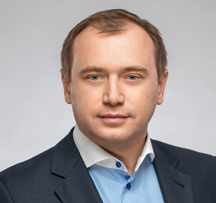Food Systems Podcast 55
In discussion with Alex Lissitsa
Friday, Dec 01, 2023
In this episode Mark Titterington talks to Alex Lissitsa, President of the Ukrainian Agribusiness Club and CEO of IMC, about his assessment of agriculture in Ukraine and the challenges faced by growers in this very difficult time. The podcast was recorded following a roundtable discussion hosted by the Forum in Brussels which discussed a recovery plan for Ukraine.
Here is a summary of the conversation.
Alex, where is Ukrainian agriculture today, and what are some of the challenges for farmers?
We do face a lot of problems besides the war. The biggest one is availability of human capital, with a lot of people on the front line. So we have to adjust our technologies. The second is the lack of availability of financial resources. A lot of businesses, especially small and medium-sized farmers, will probably give up next year because of lack of funding and low profitability, which is coming from high logistics costs. A tonne of winter wheat delivered to Spain fetches €240 per tonne in Spain. The farmer in Ukraine will get only €90 per tonne as €150 is spent on logistics etc.
How do we increase that end price for Ukrainian farmers?
We have to work together with our European partners because most of the problems, unfortunately, are coming from neighbours like Poland, Hungary and Slovakia. There is chaos on the border between Ukraine and Poland and we cannot export easily. Some of the problems can be easily solved, but I see less willingness to change the situation.
As well as the short-term challenges, what do Ukrainian farmers need in the next 1-2 years?
The list is huge! Financial resources, because in the past 2 years Ukrainian farmers have not invested. That will affect technology, productivity and yields. With the problem of human capital, we need to change our technology, be more progressive. And then logistics: we need solutions because the free trade agreement with the EU may not be prolonged. When will Ukraine become a member of the EU? We need a clear message.
How would Ukraine’ agriculture need to adapt to join the EU? And what does sustainability mean to Ukraine’s farmers?
My company, IMC has a loan from the European Bank for Reconstruction and Development and for the first time it has environmental covenants. So Ukrainian farmers have to accept special conditions, and also ESG standards.
My company will provide a benchmark, showing how we can adjust our technology. In the coming years there will be a few companies who will take into account issues like carbon farming, sustainability, agri-business standards etc.
How important is it for Ukraine, for the EU, for the world that we improve the sustainability of food and agriculture?
Sustainability is absolutely necessary and a key issue for our business. It’s painful to change, but it’s necessary to get financial resources and to sell around the world. So we have to think in that way.
The past couple of years have been unprecedented for Ukraine. Can you share your reflections, and also tell us your hopes and aspirations?
You cannot be prepared for war. I was shocked. Around 80% of my business is in the north, which was occupied in the first week. I have 2,000 employees and the main question for me was whether they were safe.
Ukraine was completely excluded from the international market. It took six months before we could sell anything, and we had no additional financial resources in that time. But finally we started to sell.
Then there was the question of how people could live in a state of war in that region, where 30% of our land was mined. We had to learn how to de-mine. We had two explosions involving our tractors. And we had a dairy farm with 1,000 cows close to the border, which Russia completely destroyed.
But we have survived, and people do believe in victory. Companies have learned to be robust, and we will start new projects.
If you have found this short summary interesting, there’s lots more to hear in the full 22-minute conversation. It is available now on iTunes, Podbean or Spotify or on this website.

Alex Lissitsa
Alex Lissitsa has been the CEO of the IMC (International Milk Company), one of the top 10 agricultural companies...see more
